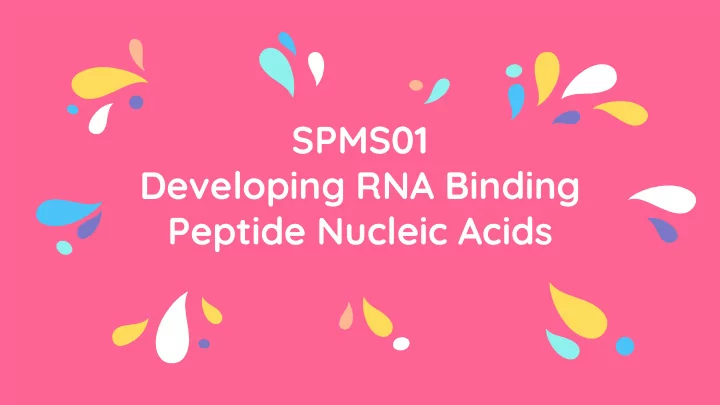

SPMS01 Developing RNA Binding Peptide Nucleic Acids
Contents 1. Introduction of the background 2. Hypothesis 3. Methodology 4. Results and Discussion 5. Conclusion 6. Future work and Applications
Introduction
Alzheimer’s ➔ A chronic neurodegenerative disease affecting approximately 29.8 million people worldwide. ➔ This disease presents a characteristic early symptom of short term memory loss.
A quick summary! A novel binding mechanism Develop a promising way to that targets both duplex and tackle Alzheimer’s through single regions in the pre- the synthesis of PNAs mRNA complementary to the tau pre-mRNA. Extrapolate to greater potency and less side effects for both Enables reduction of the Alzheimer’s and other isoform ratio by exploring the neurodegenerative disease therapeutic applications of the applications. PNA Value-adds to the field of research
Tau Hypothesis ➔ Hyperphosphorylated tau proteins pair up and form neurofibrillary tangles inside nerve cell bodies. ➔ The cell microtubules disintegrate, destroying the structure of the cell's cytoskeleton which collapses the neuron's transport system.
Hypothesis
Tau Hypothesis disintegration of microtubules which disrupt neuron cell transport system Binding affinity of the PNA strands with the RNA would be higher when manually synthesized monomers such as L, Q and E are used and when they are both single and double stranded resulting in the formation of both duplex and triplex structures.
Methodology
Methodology 1 3 2 3 Polyacrylamide Gel 1 Solid Phase Peptide Electrophoresis (PAGE) Purification of PNAs Synthesis
Solid Phase Peptide Synthesis 1 ➔ Synthesis of two PNA strands, with sequences NH2-Lys- TAAAAALTLT-CONH2 and NH2-Lys-GGACLELELT-CONH2 ➔ PNA monomers are supported by solid methyl benzhydrylamine hydrochloride polystyrene (mBHA) based resin with Boc Protecting group ➔ Wash resin with dichloromethane (DCM) and dimethylformamide (DMF) repeatedly with exposure to nitrogen gas ➔ Add coupling solution ➔ Perform Kaiser's test ➔ Neutralisation ➔ Repeat procedure manually for synthesis of the entire strand
Purification of PNAs 2 ➔ Using RP.HPLC ➔ PNA oligomer was first cleaved from the resin ➔ PNA oligomer that precipitated out was then dissolved in water and purified using double RP.HPLC so that the purest samples are used in PAGE
Polyacrylamide Gel Electrophoresis 3 (PAGE) ➔ Gel was placed at 4 degree celsius for 5 hours overnight ➔ The gels were then stained in ethidium bromide for 30 mins ➔ Visualisation using Typhoon Trio Variable Mode Imager. ➔ Testing of the binding affinity of the PNA strands with their complementary double stranded RNA molecule
Results and discussion
Results and Discussion Second RNA Upper lane First RNA Lower lane
1 Exon 10 The highly inclusion during successful splicing and remarkable binding shown on 3 2 the gel indicates a similar binding The formation A decrease in mechanism for of the 4-repeat/ 3- neurofibrillary repeat (4R/3R) the tau pre tangles are isoforms mRNAs and the significantly PNAs. inhibited. Prevent gain of function mutation: Hairpin loop is destabilised to form a single strand with greater accessibility to splicing elements such as the U1snRNP.
Future work and applications
Future Work Applications ➔ Pave way for DNA silencing using ➔ The actual effect and impact of the duplex PNA. ◆ Since the binding affinity is PNA strands in the cellular setting an important factor affecting has to be tested. ◆ Thus, cell culture studies are a the targeting and inhibition of the RNA. must to test the actual effect ➔ There is a great potential with of the synthesized PNA on the cells. regards to the production of such ➔ The exact ratio between the 4R drugs due to the higher possibility of mass production with less and 3R isoforms can then be identified to assess the significance contamination as compared to antibodies of our solution.
Conclusion
On the whole, for this project, we have focused on the increasing of the binding affinity of the PNA with the target through the development of a new duplex and triplex binding system and have proven the increase in the binding as well. ● Alzheimer's disease. (2018, December 08). Retrieved from https://www.mayoclinic.org/diseases-conditions/alzheimers-disease/symptoms-causes/syc-20350447 ● Toh, D. K., Patil, K. M., & Chen, G. (2017). Sequence-specific and Selective Recognition of Double-stranded RNAs over Single-stranded RNAs by Chemically Modified Peptide Nucleic Acids. Journal of Visualized Experiments, (127). doi:10.3791/56221 Retrieved from: https://www.ncbi.nlm.nih.gov/pubmed/28994801 ● (Gupta & Tomar R., 2012): Antisense Technology In Kumar, Gupta & Mohan (Ed.) Biotechnology in Medicine and Agriculture Principles and Practices ( pp 297-312 )
Thank you
All images self taken unless otherwise stated
Recommend
More recommend